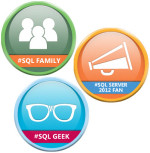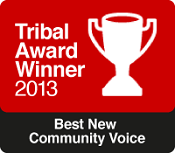Before I went to my first SQL Pass Summit, it was recommended to me to sign up for a Twitter account. I had been successfully avoiding it to that point in my career, but I was convinced that the T-SQL community is very active on Twitter and it would be well worth my time…which it has been. Since I was going to be on twitter for the professional side of my life, I did research on how to communicate appropriately on twitter. I found Brent Ozar’s (B|T) e-book, The Simple Twitter Book. This e-book explained how to best use twitter and what the shortcuts like OH and RT mean. The one thing it didn’t have, was a list of SQL Hashtags used by the T-SQL community to interact with each other socially and professionally. I have gathered some below.
- #SQLFamily – This was the hardest one to track down the meaning of. (I had to actually speak to someone to find out what it was for.) This hashtag is for anyone who wants to be involved with others who work with SQL day in and day out. You don’t have to ask to join. You don’t have to pass a test or even be elected. You’re just in. If you need some SQL love, include this hashtag in your post. If you need to have someone be excited with you for passing your first Microsoft Cert test, then shout it out with this hashtag. We’ll rejoice with you.
- #SQares – This is a new hashtag that should be used when someone in the SQL community does something to help others, like teaching computer programming at a local school, or raising money for a special cause. Thomas LaRock (b|t) talks about it here.
- #SQLHelp – If you want to ask technical questions (or answer them) on twitter, this is a great hashtag to use.
- #Tsql2sday – This is used to communicate about one of my favorite online events. The second Tuesday each month, the SQL bloggers who wish to participate join together and blog about a specific topic. This hashtag will keep you connected. Adam Mechanic (B|T) is the owner of the list o topics.
- #SQLPass – This hashtag is used by the SQL PASS community for the SQL Pass conferences. It has quite a bit of activity during the conferences.
- #Summit2012 – This hashtag changes every year for the SQL Pass Summit. It is used in conjunction with #SQLPass, but has a more specific timeframe.
- #SQLKaraoke – During SQL Pass Summit, some of us like to get together in the evenings for karaoke. To stay connected for this activity, use this hashtag.
- #SQLKilt – During SQL Pass Summit, Grant Fritchey (B|T) started wearing a kilt to support Women In Technology (WIT). It caught on and others (women and men) wear kilts on a special day listed on the SQL Pass Summit website.
- #PassPrayer – All year the group of SQL geeks that use this hashtag pray for each other. At SQL Pass they get together to pray as well.








Hi Mickey,
I’ve had trouble finding the answer to this one, I figured you would probably know.
The question is about linked reports in SSRS.
When I create a linked report and the report has a drill through it always points the user back to my deployment folder. Which they don’t have permissions for and they get an error.
Not sure what the best way to handle this is.
Thanks for your help in advance,
Mike
Hi Mike,
I was hoping I would have time this weekend to try out my solution, but I’ve run out of time.
A solution that you can try is an internal parameter in the report. Internal parameters are not visible to the user of the report. Here are the steps
1. Create a parameter.
2. Change it to be an internal parameter.
3. Set it to a relative location of the drill down report.
If you find that you need access to the parameter in the Report Manager, then make the parameter a hidden parameter.
Let me know if that works for you.
Mickey
Thank you
This sounds like it should work.